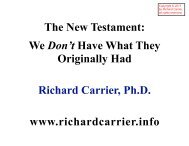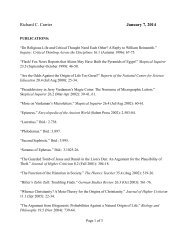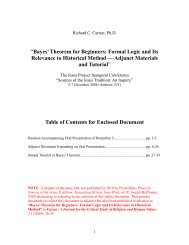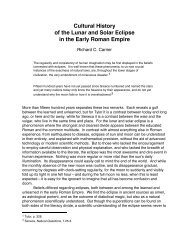Herod the Procurator - Richard Carrier
Herod the Procurator - Richard Carrier
Herod the Procurator - Richard Carrier
Create successful ePaper yourself
Turn your PDF publications into a flip-book with our unique Google optimized e-Paper software.
Analysis of this question is key to revealing <strong>the</strong> sorry state of <strong>the</strong> texts of<br />
Josephus, proving <strong>the</strong> need is great for new critical work wholly independent of Niese. In<br />
his apparatus, Niese says that <strong>the</strong> reading of auton in all <strong>the</strong> o<strong>the</strong>r mss. is “hardly right; it<br />
seems a gap ought to be here” ( vix recte; lacuna statuenda vid.). He does not say why he<br />
doesn’t think auton can be correct, but <strong>the</strong> only reason imaginable is that it seems to state<br />
<strong>the</strong> impossible: a foreign client king being made governor of a Roman province. This<br />
must be Niese’s reasoning, since <strong>the</strong>re is nothing grammatically wrong with <strong>the</strong> reading<br />
of auton (obviously referring to <strong>Herod</strong>), in fact it is exactly what we should expect given<br />
what <strong>the</strong> BJ says, though it is strange that Niese of fers no remarks or emendations for<br />
that passage, even though it says essentially <strong>the</strong> same thing. But supposing this was his<br />
reasoning, why did Niese think autên was a better reading? Perhaps because <strong>the</strong> feminine<br />
would not make <strong>Herod</strong> <strong>the</strong> object of <strong>the</strong> sentence, but <strong>the</strong> territory he was being given (in<br />
<strong>the</strong> preceding passage). The sentence would <strong>the</strong>n read “[Augustus] adjoined this<br />
[territory] to those who were procurating Syria, giving orders to do everything with<br />
[<strong>Herod</strong>’s] judgement.” This would make a nice solution: instead of giving <strong>Herod</strong> power<br />
over Syria, Augustus is merely loaning his personal agents in Syria to <strong>Herod</strong>, ordering<br />
<strong>the</strong>m to also work for him in administering financial matters in his newly-acquired lands.<br />
This would be legally uncontroversial: <strong>the</strong> same men serving as employees of Augustus<br />
in Syria simply serve as employees of <strong>Herod</strong> in an adjacent section of <strong>Herod</strong>’ s kingdom.<br />
But this all falls apart when we compare this passage with <strong>the</strong> BJ, which definitely<br />
excludes this interpretation (even if we tried to emend <strong>the</strong> text in some plausible way),<br />
and <strong>the</strong> agreement of meaning between <strong>the</strong> reading of auton in <strong>the</strong> AJ and what is stated<br />
in <strong>the</strong> BJ, coupled with <strong>the</strong> noted unreliability of <strong>the</strong> Palatinus ms., and <strong>the</strong> universal<br />
agreement of all o<strong>the</strong>r mss. (and even Latin translations, which have eum), certainly<br />
excludes autên as an acceptable reading. However , it is not certain that this is even what<br />
Niese had in mind, since he apparently thought some additional text was required, which<br />
he <strong>the</strong>n proposed had fallen out in copying, and <strong>the</strong>refore he believed <strong>the</strong> received text<br />
was in some sense illegible, but this removes any plausible support he could have had for<br />
accepting autên as <strong>the</strong> correct reading.<br />
Through <strong>the</strong>ir distortion of Niese’s original note later editors show that <strong>the</strong>y never<br />
actually looked at <strong>the</strong> mss. <strong>the</strong>mselves. As we saw, Niese’s actual words were “ vix recte;<br />
lacuna statuenda vid.” But Naber rewords Niese’ s comment to say “ lacunam notavit<br />
Ns.,” in o<strong>the</strong>r words, “Niese noted a gap,” an ambiguous paraphrase that seems to assert<br />
ra<strong>the</strong>r than conjecture. Ralph Marcus reworded this yet again in <strong>the</strong> apparatus to <strong>the</strong> Loeb<br />
edition as “post hoc verbum lacunam stat. Niese,” in o<strong>the</strong>r words, “after this word lies a<br />
gap [according to] Niese.” 14 Thus, what began as a merely conjectured missing word or<br />
two became a mythical ‘observed lacuna’ in <strong>the</strong> text. This gives us little confidence that<br />
14 Both taken from <strong>the</strong> apparati to <strong>the</strong> relevant passage in Naber and in Marcus, op. cit.<br />
6








